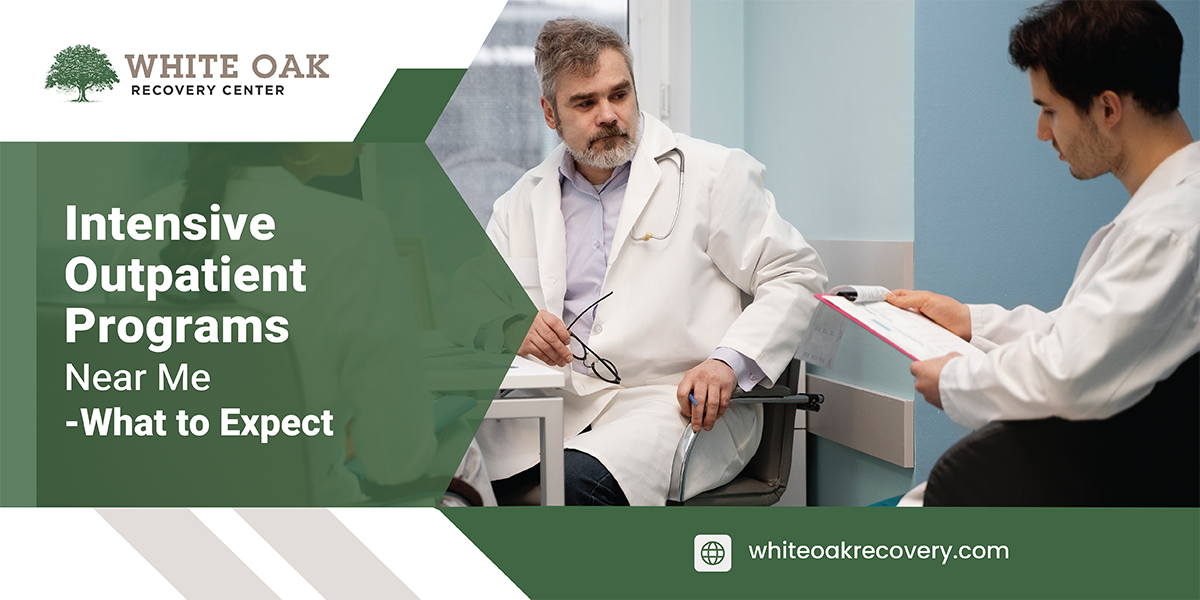Intensive Outpatient Programs Near Me- What to Expect?


Medical Writer:
Nisa Samar
Reviewer:

Johnny Kim
Executive Psychotherapist
Medical Writer:
Nisa Samar
Reviewer:

Johnny Kim
Executive Psychotherapist
An intensive outpatient program (IOP) is a structured treatment for addiction, mental health, and co-occurring conditions. It offers expert care, therapy, and aftercare support through multiple weekly sessions. If you’re searching for “Intensive Outpatient Programs Near Me” while having the option to return home, White Oak Recovery has comprehensive insurance-covered treatment plans. Call now at 1-844-955-2438.
Table of Contents
Toggle- How Do Intensive Outpatient Programs Work?
- What To Expect in the White Oak Recovery Intensive Outpatient Program
- How Long Does an Intensive Outpatient Program Last?
- 5 Major Addictions Treated by IOP
- What Is the Success Rate of the IOP Program?
- Who Might Benefit From an IOP?
- How Do I Choose the Right IOP Program for Me?
- Get Help From White Oak Recovery Today!
- Frequently Asked Questions About Intensive Outpatient Programs Near Me
- Additional Resources
How Do Intensive Outpatient Programs Work?
Intensive Outpatient Programs offer a higher level of treatment intensity than outpatient programs. However, the treatment intensity in an IOP is lower than that of an inpatient rehab.
An IOP typically offers:
- Multiple weekly sessions that may last several hours
- A complete focus on mental health and substance abuse
- Coping mechanisms to teach balancing treatment with daily life
Most intensive outpatient programs have a full team of professionals that supports patients’ mental and physical wellness, including :
- Nurse practitioners
- Doctors
- Psychologists
- Social workers
These professionals are responsible for treating conditions like:
- Anxiety
- Depression
- Trauma & PTSD
- OCD
What To Expect in the White Oak Recovery Intensive Outpatient Program
If you or a loved one is struggling with addiction or has recently completed detox, the next steps in treatment will include going to a less severe form of treatment. IOPs are the best place to heal your inner self. Here is what you may expect at an Intensive Outpatient Program Near You:
1. Cognitive Behavioral Therapy (CBT)
The focus of Cognitive behavioral therapy (CBT) is to modify the habitual negative thinking that can cause and exacerbate mental problems like sadness and anxiety.
2. Family Groups
This approach is “community as method,” in which any social contact can lead to transformation and assist people in developing stronger abilities through healthy skill development.
3. Dialectical Behavioral Therapy(DBT)
It is sometimes also referred to as “talk therapy.” DBT helps the patient to overcome negative thought patterns and make beneficial behavioral improvements.
4. Dual Diagnosis Care
Many people suffer from both addiction and mental health issues simultaneously. To treat one, the other should be treated at the same time. This is why IOPs screen and treat both illnesses together in specialized Dual Diagnosis Programs. This form of treatment may help heal from the inside out.
5. Aftercare Programs
Aftercare refers to programs that assist patients recovering from addiction to adjust to ordinary community life. It starts once patients complete the earlier stages of addiction treatment. With an Aftercare plan, the patients learn to avoid the triggers and achieve long-term success.
6. 12-Step Facilitation
12-step facilitation consists of a different approach. These include counseling, application of procedures, promoting meeting attendance, and short interventions through community mutual-help groups.
7. Recreational therapy
Recreational therapies are a hands-on approach to recovery that involves art, adventure, and animal-assisted therapies. This supports healing and recovery. It addresses the physical, emotional, and relational needs of the patient.
8. Motivational Approaches
This treatment accepts that substances or behaviors had a purpose at some time. This approach is also directive. It uses strong encouragement to face habits that do not correspond with one’s intended goals.
How Long Does an Intensive Outpatient Program Last?
There is no specific timeframe for the duration of an intensive outpatient treatment. Usually, an IOP program consists of either 30 or 90 days of treatment. However, the duration may vary depending on the severity of the patient’s condition. Generally:
- IOPs last between 8 and 12 weeks
- Treatment sessions last three to five days per week
The program may begin with daily meetings. Advances to appointments lasting 3 to 5 days per week. Each program session can last between four to nine hours.
Factors Influencing Treatment Duration In an Intensive Outpatient Program
Many factors can influence a patient’s time required in an Intensive Outpatient Program. These include:
- The severity of addiction
- Their progress in treatment
- Any co-occurring mental health disorders

5 Major Addictions Treated by IOP
IOPs are beneficial in treating a variety of substance use issues, including:
- Opioid Use Disorder (OUD)
- Marijuana Addiction
- Stimulant Addiction
- Heroin Addiction
- Alcohol Addiction
What Is the Success Rate of the IOP Program?
As per a 2014 meta-analysis, Intensive Outpatient Programs are just as successful as inpatient treatment programs for the majority of people with alcohol or substance use addiction problems. It, however, must be noted that research indicates that the effectiveness of addiction rehabilitation is strongly correlated with the support of loved ones, family, and the community. Many rehab programs project success rates on factors like:
- People who have completed the program.
- The percentage of sober individuals shortly after an IOP.
- Alumni interviews.
- Internal studies.
Who Might Benefit From an IOP?
Patients who might benefit from this sort of program include:
- Those who need more structure or feel that therapy alone isn’t enough
- Motivated to participate in the program and work towards recovery
- Capable of verbally expressing their thoughts and feelings
- Comfortable in group treatment settings
- Does not require detox or 24-hour care due to their condition
- Capable of learning and applying therapeutic skills
- People who want to stay at home but still work on their recovery several days a week
How Do I Choose the Right IOP Program for Me?
When picking an IOP, check for:
- Certification and licensure to assure high-quality therapy.
- The staff’s qualifications include therapists and medical specialists.
- The program’s length and how it will fit into your schedule.
- The program provides the therapies and services you require.
Get Help From White Oak Recovery Today!
At White Oak Recovery, our focus is on the underlying reasons that led you to fall into addiction in the first place. Our holistic approach helps you or your loved one escape the matrix of addiction once and for all and embrace the positive side of life. We have a non-judgmental staff who offer:
- Personalized addiction treatment
- Behavioral Therapies
- Flexible Schedule
- Support during the recovery process
At White Oak Recovery, our DEA-certified practitioners offer an insurance-backed intensive outpatient program near you. Get in touch today and give yourself the gift of hope and recovery. Call now at 1-844-955-2438.!
Frequently Asked Questions About Intensive Outpatient Programs Near Me
Here are some commonly asked questions about “ What To Expect in Intensive Outpatient Programs Near Me”:
Can You Work While in IOP?
Yes, you certainly can. One of the primary benefits of Intensive Outpatient Programs is their versatility. They are particularly intended to fit around your schedule, so you may continue working while receiving treatment.
Do They Drug Test You for IOP?
Yes, IOP programs assess drug and alcohol usage. This testing may even be needed by insurance providers to reimburse IOP treatments.
Are Intensive Outpatient Programs Near Me Considered Hospitalization?
No, an Intensive Outpatient Program (IOP) does not constitute hospitalization. IOPs allow people to stay at home while undergoing scheduled therapy sessions. In contrast, hospitalization, sometimes known as inpatient, requires patients to stay at the treatment center.
Why Is IOP Effective?
Intensive Outpatient Treatment (IOP) offers several benefits, including:
- flexibility
- continued support after inpatient care
- opportunities to practice skills outside of treatment
- a structured schedule
- a support system
Is White Oak Recovery’s IOP Covered by Insurance?
Yes! Most health insurance policies cover a wide range of addiction treatment options, including intensive outpatient programs. However, depending on your insurance policy, the extent of coverage may differ. Verify your insurance now!
Additional Resources
What is a Substance Use Disorder?
The Difference Between Sobriety and Recovery
Understanding Polysubstance Use

Am I covered for addiction treatment?
Your insurance may cover treatment. Call now for an entirely free and confidential assessment. Recovery starts with a phone call.

- https://eudaimoniahomes.com/can-use-insurance-pay-iop/
- https://rocklandrecoverybh.com/behavioral-health-blog/can-i-work-while-in-an-intensive-outpatient-program/https://clearforkacademy.com/blog/is-iop-worth-it/
- https://www.charliehealth.com/treatment-modalities/trauma-informed-therapy
- https://www.embarkbh.com/intensive-outpatient-programs/
Medical Disclaimer:







